Key takeaways:
- Personal motivation is enhanced by setting clear, achievable goals and celebrating small victories.
- Creating a consistent routine and finding accountability partners significantly boost motivation and commitment.
- Practicing positive self-talk and reflecting on progress help adjust strategies and strengthen resilience towards achieving goals.

Understanding personal motivation factors
Understanding what motivates me on a personal level has been a journey. For instance, I’ve discovered that my strongest motivation comes from setting clear, attainable goals. I often ask myself, “What small victories can I achieve today?” This shifts my focus from overwhelming tasks to bite-sized accomplishments that keep me energized.
Emotionally, I realize that my motivation is deeply tied to my passions. I remember a time when I delved into a project simply because I loved the topic—it didn’t feel like work at all. This experience made me wonder: how often do we pursue things solely for the joy they bring us?
Support from others also plays a crucial role in fueling my motivation. There have been moments when a simple word of encouragement from a friend sparked a fire in me to keep pushing forward. Do you find that others’ beliefs in you can instill a greater sense of purpose? It’s fascinating how external affirmation can bolster our internal drive.
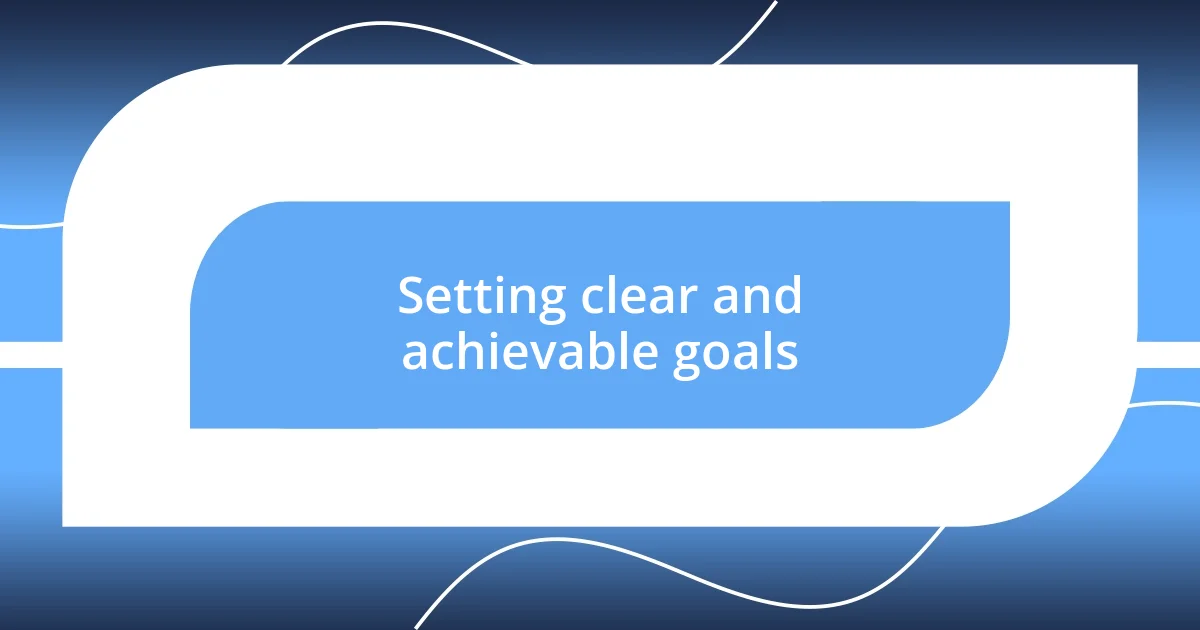
Setting clear and achievable goals
Setting clear and achievable goals has always been a fundamental strategy for me. I find that when my goals are specific, they’re much less intimidating. For example, instead of saying I want to get fit, I commit to a goal like exercising for 30 minutes three times a week. This clarity transforms what might feel like an enormous task into a sequence of attainable steps, which keeps my motivation alive.
In one experience, I set a goal to read 12 books in a year—one per month. At first, it felt daunting, but breaking it down into manageable weekly reading targets made it achievable and enjoyable. Each book felt like a mini-victory, and tracking my progress gave me a satisfying sense of accomplishment that fueled my passion for reading even more. Have you ever noticed how a well-defined goal can create a ripple effect in your motivation towards other areas of your life?
I also believe in the power of re-evaluating goals as I progress. Sometimes, I’ve set a goal that seemed great initially, but along the way, I realized it didn’t align with my current interests or circumstances. For example, I once aimed to run a marathon but discovered that I preferred shorter, more enjoyable runs instead. Adapting my goals to suit my evolving passions kept me motivated and helped me stay engaged with my activities, ensuring that my pursuit remains fulfilling.
| Characteristics | Examples |
|---|---|
| Specificity | Exercise for 30 minutes three times a week. |
| Measurable | Reading one book per month. |
| Achievable | Running 5k instead of a full marathon. |
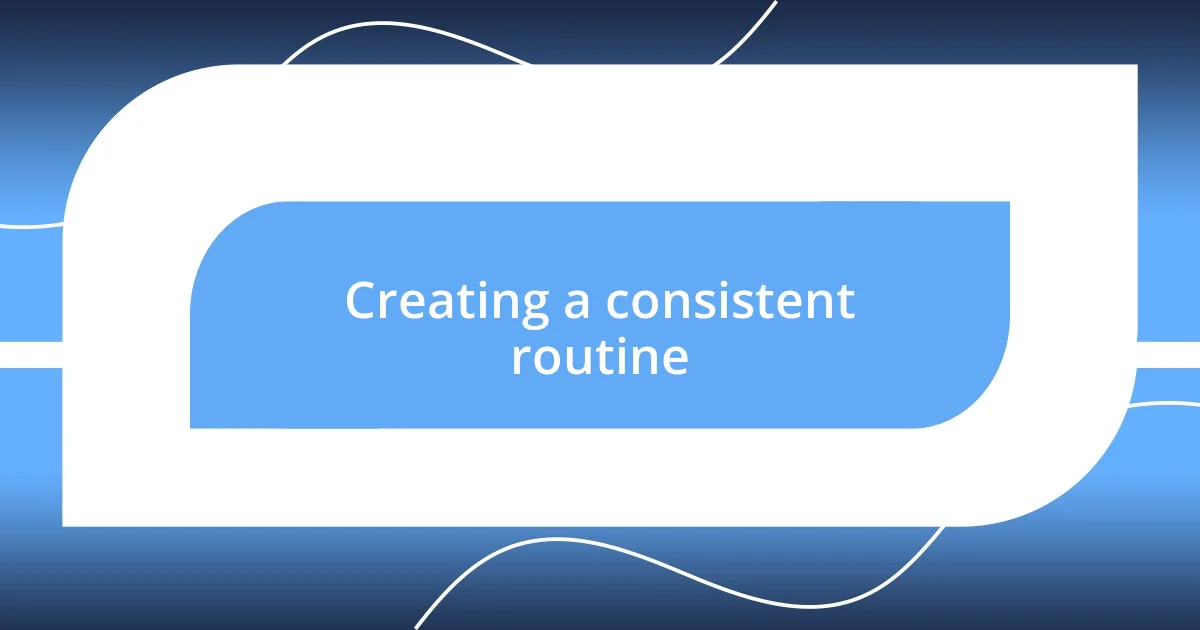
Creating a consistent routine
Creating a consistent routine is one of the cornerstones for sustaining my motivation. I find that sticking to a daily schedule helps me minimize distractions and stay focused on my tasks. There’s a certain comfort in knowing what my day looks like, allowing me to allocate my energy to productive pursuits rather than decision-making fatigue. For instance, I’ve embraced morning rituals—like a cozy cup of coffee and journaling—for setting a positive tone for the day. It’s almost like carving out a moment just for myself amidst life’s chaos.
- Morning rituals enhance focus and set a positive tone.
- A consistent start helps reduce decision fatigue.
- Allocating specific time slots for different tasks increases productivity.
On the weekends, I’ve made it a point to reflect on my week and plan for the next. This intentional pause not only helps me recalibrate but also allows me to celebrate my wins, no matter how small. I remember once feeling overwhelmed by all the tasks I had to juggle during a busy week. But by taking a moment every Saturday to map out my priorities, I turned that anxiety into a clearer action plan. Suddenly, the challenges felt manageable again, and my motivation soared as I tackled them one at a time. This consistent practice strengthens my commitment to my goals and reminds me of my progress along the way.
- Weekly reflections help to recalibrate and recharge motivation.
- Celebrating small victories fosters a sense of achievement.
- Mapping out priorities transforms anxiety into actionable steps.

Finding accountability partners
Finding the right accountability partner can truly elevate your motivation to new heights. I remember when I teamed up with a friend to pursue our fitness goals together. We set weekly check-ins, which not only kept me accountable but also added a sense of camaraderie to the process. Have you ever felt that thrill when someone else is in it with you, cheering you on and pushing you to stay committed?
It’s fascinating how a simple text or call can remind me to stay on track. Just last month, my accountability partner sent me a quick message, asking about my writing goals for the week. That nudge was just what I needed to get started. Sometimes, I think about how easy it can be to slip into complacency without that external support. Don’t you find that having someone who genuinely cares about your progress can inspire you to push a little harder?
I also learned the importance of choosing the right partner—someone who shares similar goals but also has their own unique approach. For instance, my partner lightens challenging tasks by incorporating fun challenges, like mini competitions in our writing sessions. This playful element makes the grind much more enjoyable. So, who’s that someone in your life who can be your accountability partner? Establishing that relationship can make a world of difference in staying motivated and committed.
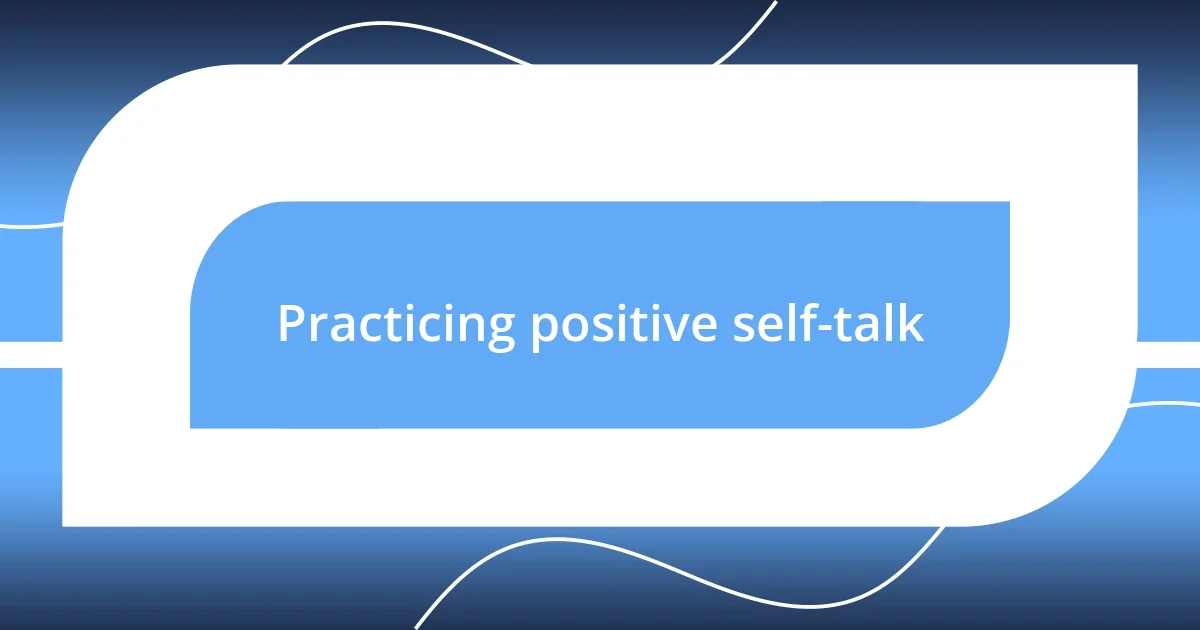
Practicing positive self-talk
Practicing positive self-talk is something I’ve found to be a game changer for my motivation. Whenever I catch myself spiraling into negativity, I consciously remind myself to flip the narrative. For example, instead of saying, “I can’t do this,” I tell myself, “I’m learning and improving every day.” This shift not only uplifts my spirits but also empowers me to take action.
I vividly remember a time when I had to prepare for a major presentation. As I stood in front of the mirror, anxiety crept in, whispering doubts. But I took a deep breath and started listing all the reasons I was capable. “I’m knowledgeable, I’ve prepared thoroughly, and I can connect with my audience,” I said to my reflection. By the time I finished, I felt a surge of confidence that propelled me through that presentation with ease. Doesn’t it feel liberating to realize that the voice inside our heads can be our biggest supporter rather than our worst critic?
Integrating positive self-talk into my daily routine has become like a melody that keeps playing in the back of my mind. I often use affirmations, like “I’m capable of achieving my goals,” to anchor myself during tough moments. This practice has made a noticeable difference in my outlook and resilience. Have you ever tried speaking kindly to yourself? It’s truly remarkable how a few simple, uplifting words can reshape our mindset and fuel our drive to keep moving forward.
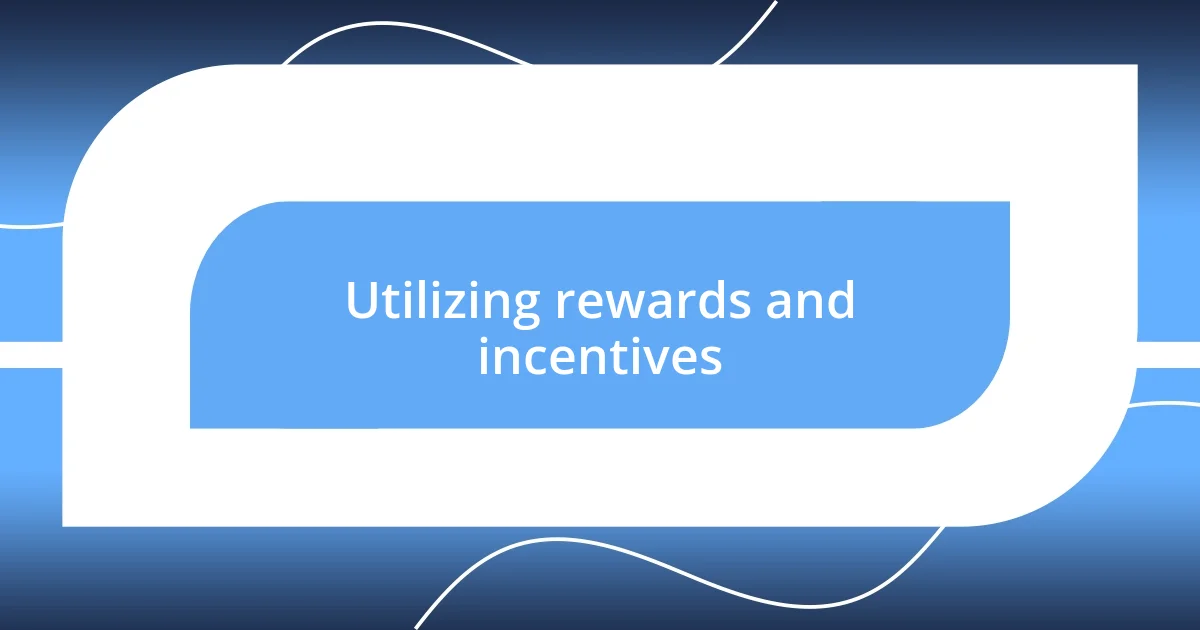
Utilizing rewards and incentives
Rewarding myself has been an essential part of how I maintain motivation. I remember when I completed a longstanding project; I treated myself to a fancy dinner. It might seem simple, but having that reward to look forward to made the grind much more bearable. Isn’t it interesting how small incentives can transform our approach to tasks?
Incorporating incentives into my daily routine has created a fun incentive system. For instance, I set mini-milestones while writing, and once I reach one, I allow myself an episode of my favorite show as a reward. This balance of work and play keeps the enthusiasm alive. Have you ever noticed how a little reward can boost your energy levels and spark creativity?
I find that making my rewards meaningful is crucial. They shouldn’t just be random treats, but rather reflections of my efforts and goals. When I completed a challenging writing workshop, I bought myself a beautiful notebook I had been eyeing. It was a way to celebrate my achievement while also providing a new tool for future endeavors. Doesn’t it feel great to acknowledge your hard work in a way that fuels your future motivation?
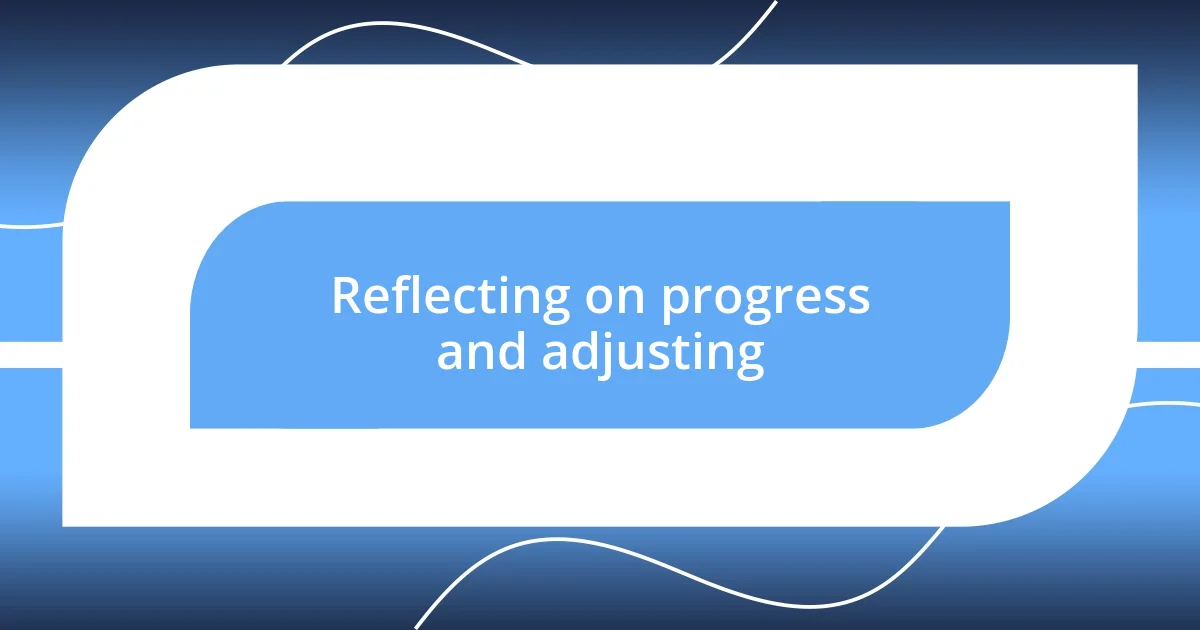
Reflecting on progress and adjusting
Reflecting on my progress is a practice I can’t underestimate. I often take time at the end of each week to look back at what I’ve accomplished and where I fell short. It’s surprising how a moment of reflection can spark clarity. Have you ever felt that rush of realization when you acknowledge your growth? It makes the effort feel more worthwhile.
I vividly recall a project that didn’t go as planned; I was frustrated and disheartened. But as I sat down to assess what went wrong, I found it was a learning opportunity in disguise. By identifying my missteps—like poor time management—I could adjust my planning for future tasks. Don’t you think that pauses for reflection can help us redirect our paths more effectively?
Adjusting my strategies based on what I’ve learned has been key to my ongoing motivation. For instance, I realized that some methods worked better for me than others, and I shifted accordingly. By embracing this fluidity in my approach, I’ve found new excitement in pursuing my goals. How often do you reassess your methods to ensure they’re still serving you? Knowing when to pivot can be just the boost we need to keep pushing forward.














